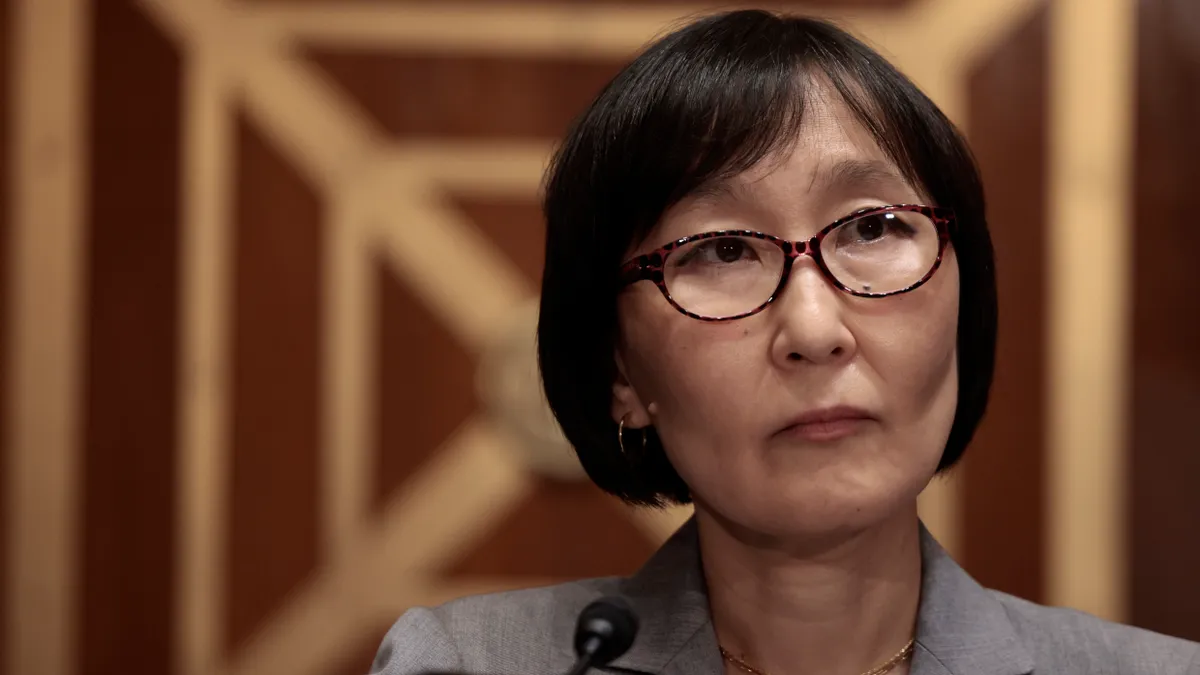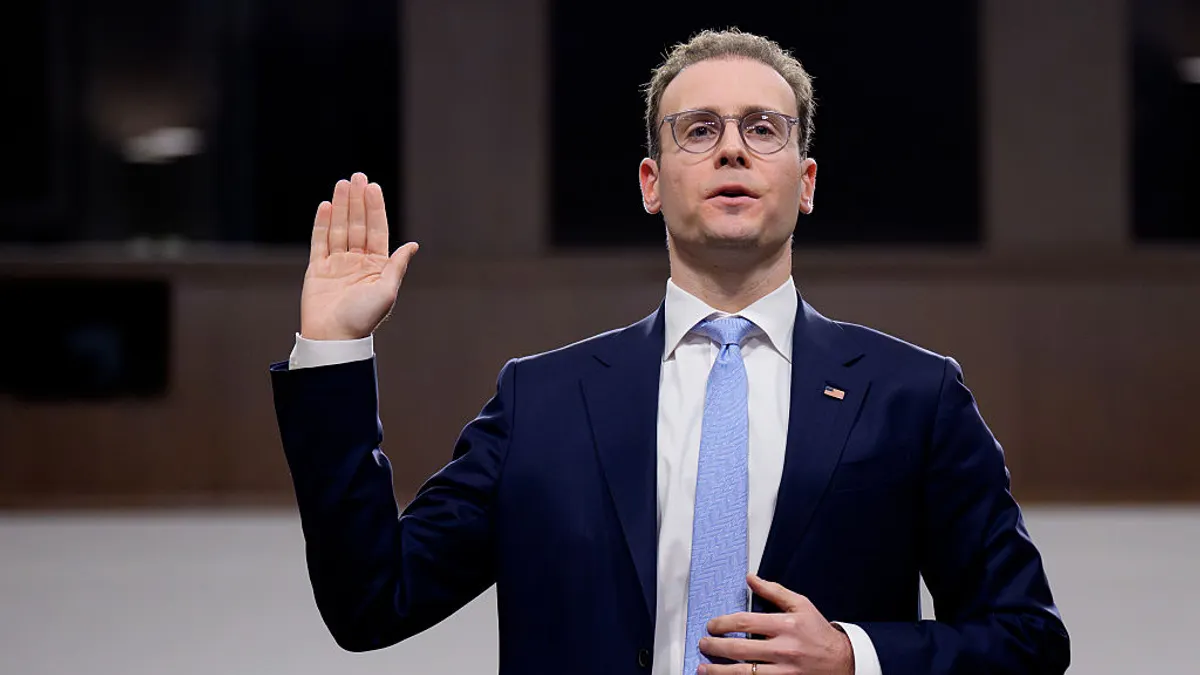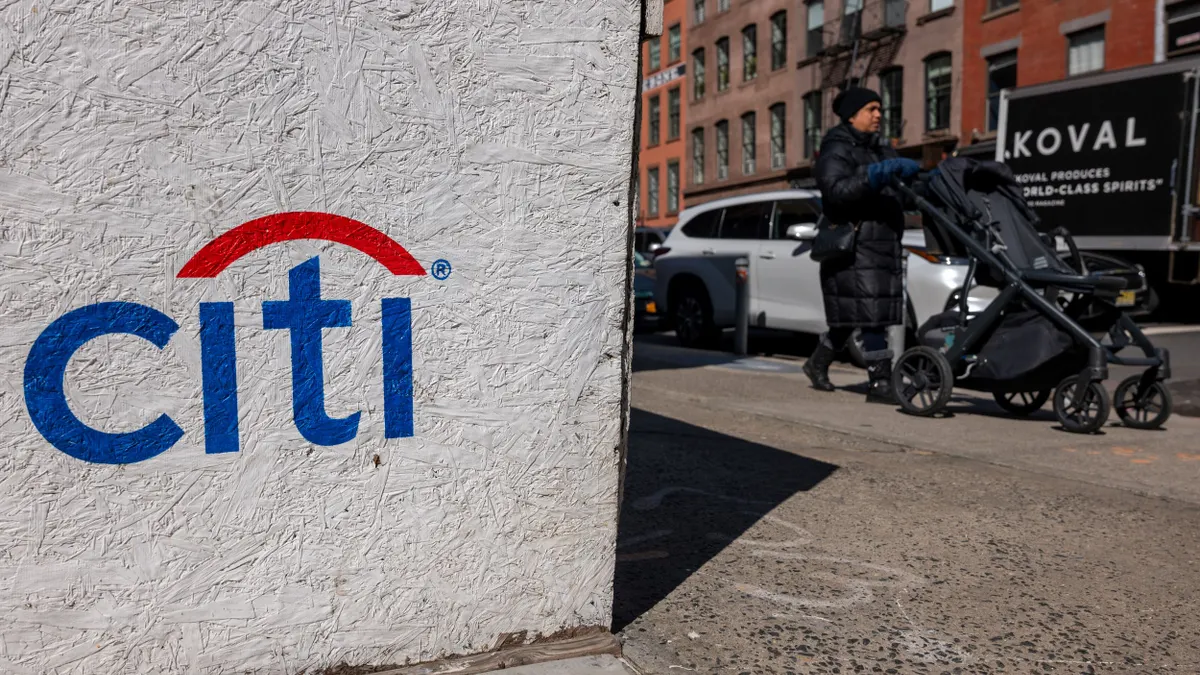Cornell Law Professor Saule Omarova answered questions about her upbringing in the Soviet Union, a paper she wrote as an undergraduate and recent comments she made about the fossil fuel industry during a contentious 2½-hour hearing Thursday in front of the Senate Banking Committee.
The hearing — which the panel's chairman, Sen. Sherrod Brown, D-OH, called one of its most attended — highlighted just how polarizing Omarova’s nomination to head the Office of the Comptroller of the Currency (OCC) has become among Democrats and Republicans.
If confirmed, Omarova would helm an agency that has been without a permanent head since Joseph Otting stepped down in May 2020.
She would also be the first woman and first person of color to head the OCC, which regulates more than 1,000 of the nation’s banks.
Most Democrats on the committee applauded her career as an academic and banking law attorney, with Brown calling her "one of the most qualified nominees ever."
But the panel also highlighted a bipartisan concern Omarova has generated among lawmakers, with Republicans and some moderate Democrats questioning her past writings and public comments on bank oversight, saying they reveal "radical" views regarding the U.S. financial system.
In his opening statement, Brown referenced a request from the panel's ranking member, Sen. Pat Toomey, R-PA, that Omarova provide the committee with the undergraduate thesis she wrote on Karl Marx while studying at Moscow State University in the 1980s.
"I don't remember any nominee who faced a similar request, nor do I think that what college kids write is generally a good guide for their policy views three decades later," Brown said.
Omarova told the committee the paper, which Toomey has been demanding for weeks, was written while she was a student under the communist regime, and doesn’t reflect her current views.
Toomey said Omarova informed his staff last week that she no longer has a copy of the paper.
"It just seems odd that we would have to wait six weeks to discover that," Toomey said. "And it seems odd that you would make all these arguments for why it shouldn't need to be turned over if that's all a moot point."
Omarova, whom President Joe Biden tapped in September to lead the OCC, has been the target of such criticism from Republicans from the start.
The law professor, who once served in the Treasury Department during the George W. Bush administration, responded to attacks on her ideology, telling the committee in her opening statement that she fully supports a fair and competitive market, and touted the importance of community banks’ role in the U.S. financial system.
Still, some Republicans continued to question her upbringing.
Sen. John Kennedy, R-LA, asked if she’d ever resigned from a group called "The Young Communists" during her childhood spent in Kazakhstan during the Soviet-era.
The question prompted Brown to interject.
"She renounced her Soviet citizenship," he said, prompting a testy exchange between the two senators.
"You're not the witness, she is," Kennedy responded, before asking Omarova if she could provide the committee with her letter of resignation from the group.
"I don't mean any disrespect, but I don't know whether to call you ‘professor’ or ‘comrade,’" Kennedy said.
"I am not a communist," Omarova said. "I do not subscribe to that ideology and I could not choose where I was born."
Sen. Jack Reed, D-RI, argued her time at the Treasury Department during the Bush presidency should quell any concerns Republicans have about her alleged communist ties.
"I don't know President Bush that well, but I don't think he had a habit of appointing Marxist socialist Leninists to public office," he said.
Brown called the attacks on Omarova’s past "what happens when Trumpism meets McCarthyism," while Sen. Elizabeth Warren, D-MA, called the rhetoric "vicious and personal."
"We've just seen sexism and racism straight out of Joe McCarthy's 1950s Red Scare tactics," she said. "It is all there on full display. Welcome to Washington in 2021."
Challenges ahead
Over the course of the hearing, Republicans and most Democrats on the committee responded to Omarova with a sentiment and a line of questioning that generally fell along party lines.
But it was the level of concern expressed by some moderate Democrats that indicated Omarova’s nomination will face an uphill battle in the evenly divided Senate.
Sen. Jon Tester, D-MT, took issue with Omarova’s past public comments where she said small oil and gas companies should go bankrupt to combat climate change.
"In my real life, I'm a small family farmer in eastern Montana. There could be somebody in a position that would say you know what, the big guys are far more efficient," he said. "Do you see how risky that is to make that statement?"
In several instances during the hearing, Omarova told lawmakers the statements were taken out of context, "poorly phrased" and "not well framed."
"I do not intend to advocate that kind of position," she told Tester. "My intention was actually the opposite, that we need to help those companies to get restructured."
Tester, along with Sen. Mark Warner, D-VA, said they were disappointed with Omarova’s criticism of a 2018 Senate bill President Donald Trump signed into law that provides regulatory relief to small and midsize banks. Both Tester and Warner helped write the bill.
Omarova, who, in past testimony, described the bill as "dismantling and weakening regulation and supervision," said that while the bill was intended to help the smallest institutions, she believed larger lenders would also benefit from the relief.
"I think [the bill] helped our smaller institutions," Warner said. "I would very much disagree with your characterization of that bill."
Omarova clarified that she didn’t oppose the entirety of the bill but was concerned it would inadvertently loosen "the regulatory oversight of the largest financial institutions that engage in high-risk trading operations that do not necessarily follow the traditional relational banking model."
"However, as I said in my testimony, I was fully supportive and I remain fully supportive of tailoring regulatory requirements and lightening the regulatory burden on community banks and smaller banks that do not engage in such activities," she said.






















